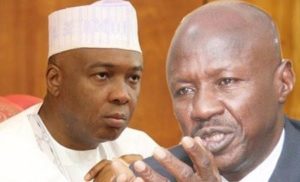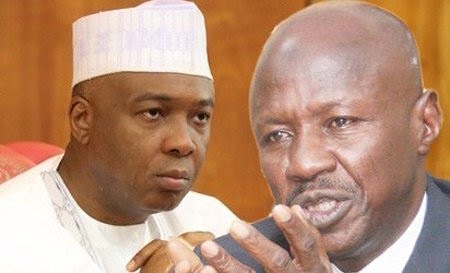 Senate President Bukola Saraki and Chairman of EFCC, Ibrahim Magu
Senate President Bukola Saraki and Chairman of EFCC, Ibrahim Magu
By David Olalekan
The President of the Senate, Dr. Abubakar Bukola Saraki, has told the Economic and Financial Crimes Commission (EFCC) to stop witch hunting him.
In a release yesterday signed by his Special Adviser on Media and Publicity, Mr. Yusuph Olaniyonu, Saraki said he believes the latest decision of the anti-graft agency to investigate his activities while he served as governor of Kwara state is “a mere witch-hunt exercise, aimed at settling scores, laced with malicious and partisan motives.”
The statement, which punctured some of the earlier claims by EFCC, especially one bothering on its letter to Kwara State government which it said predates the appointment of Saraki as International Human Right Commission (IHRC) Ambassador; said there was need for members of the public to be reminded that “Dr. Saraki’s tenure as Kwara State Governor has been investigated several times since his last months in Office in 2010 till date.”
“In fact, at a point, as incumbent Governor, he voluntarily waived his immunity and submitted to investigation and yet nothing was found against him. Also, members of the public should be reminded that during the proceedings of his trial at the Code of Conduct Tribunal (CCT) between 2015 and 2018, it became clear that the evidence relied upon was from investigations conducted by the EFCC on his tenure as Governor and that is why the lead witness for the prosecution was an EFCC agent, Michael Wetkas. Yet, the CCT in its judgement dismissed the 16 charges filed against Dr. Saraki and that verdict was upheld by the highest court of the land, the Supreme Court”, the statement clarified.
Saraki reminded EFCC that several persons have served or currently serving as governor since he left office in 2011. “Tens of governors have been in and out of our various State Houses. Like wise, hundreds of Senators and Representatives have been in and out of the National Assembly. To single out one individual for persistent investigation can only be logically and plausibly interpreted to be a witch-hunt. This is definitely no fight against corruption. It is a battle waged against a ‘political enemy’. It is a ‘label to damage’ plot”, the statement emphasized.
Dr. Saraki further alleged that a letter from the EFCC signed by its Director of Operations, Mohammed Umar Abba, was only sent to the office of the Senate President and not to both chambers of the National Assembly. The statement clarified that “it is the first time such a letter is written to the office of the Senate President at the twilight of the tenure of the National Assembly indicating hostile investigation along these lines. None of his predecessors got such ‘exclusive’ treatment in which their office was investigated by state officials seeking to nail them at all cost”.
Hinting at a possible vendetta by the Ag. EFCC Chairman, Ibrahim Magu, over the refusal of the Senate under Saraki to confirm his appointment; Saraki noted that “the decision not to clear Magu was not a personal issue between both men. It was an institutional decision which was taken on a day that the public freely follows the proceedings through live coverage on television. This was done to avoid accusations that some people seized the process to deliberately deny Mr. Magu fair hearing.”
Parts of the statement read: “What EFCC does not know is that all the issues they are seeking to probe in the office of the Senate President are handled by the National Assembly Management, that is the bureaucracy of the federal legislature.”
“The Senate President has nothing to do with such issues. However, in the eagerness and desperation to nail Dr. Saraki, they ignored even the basic facts upon which the entire investigation rests.
“Let it be known that the usual claim by the EFCC that its actions were directed against corrupt elements does not apply to Dr. Saraki because he is a man who at every point in his public service life has sought to institute transparency and accountability in governance. Dr. Saraki has always worked to promote transparency in governance in all the places he had held public office. For example, as Governor of Kwara State, he waived his immunity to enable his regime be probed and introduced the Price Intelligence Unit, the first by any state. This unit reduced leakages in government revenues. The idea was later adopted by the Federal Government as it became Bureau of Public Procurement(BPP).
“Kwara State under his governorship was the first state to be rated by Fitch, the global rating agency which affirmed its National Long term rating at AA-(minus) and ratings of B+ in public finance transparency. In 2006, the EFCC under Mallam Nuhu Ribadu in a report presented before the Senate gave Kwara State under his tenure a clean bill of health, alongside five other states. At the end of his tenure in 2011, the anti- corruption agency did not find any reason to invite him for any questioning. It was more than a year after he left office when he moved the controversial motion calling for investigation into fuel subsidy that the EFCC first invited him for investigation and nothing came out of that effort. Again, Dr. Saraki in his first term in the Senate was the one who through a motion on the floor exposed the biggest fraud in the country then. That is the oil subsidy scam. Such a person can definitely not be said to be a corrupt element.”
The statement finally enumerated some of the legislative policies initiated by the Senate under the leadership of Dr Saraki to support the fight against corruption. The National Financial Intelligence Agency Act; Proceeds of Crime Bill; Federal Audit Services Commission Bill; Whistleblowers Protection Bill; Mutual Assistance in Criminal Matters Act; Witness Protection Bill were listed as some of the Senate’s anti-corruption interventions under Saraki.
“These are more fundamental issues that can make permanent the anti-corruption war and remove it from the realm of whimsical pursuits. All these are legislative measures taken by the Eighth Senate led by Dr. Saraki to make the EFCC and other anti-corruption agencies more efficient, and generally, in aid of the fight against corruption”, the release added.
Saraki, who said he was proud that under his leadership as President of the 8th Senate “there has not been any case of bribery scandal or misappropriation in the procurement process”, reiterated that he has fulfilled the promise he made to ensure more transparency in the senate; stating that the details of the budget of national assembly is now placed in the public domain for scrutiny by the general public.
While clarifying that he was not out to frustrate EFCC in the conduct of its official functions; Saraki advised the agency to “be professional, ethical, transparent and consistent. It cannot be deemed professional when the agency is not consistent in the application of its rules and the laws to all cases and individuals.”



They are only trying to negotiate leadership of national assembly with him after his tenure. They want him to toe the line of their endorsed candidates. Some men can’t naturally be cowed. Not what Saraki has gone through in their hand. No amount of blackmail can make him do their biddings. The move is childish. It isn’t EFCC that is acting , some actors are behind such mischievous political negotiating gambit.